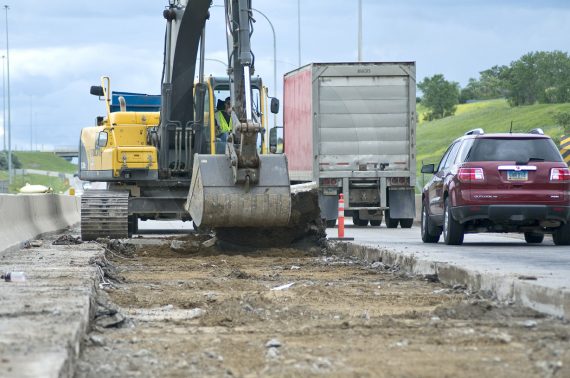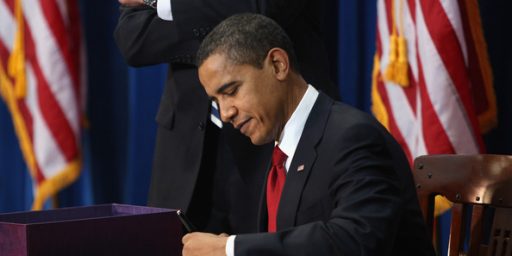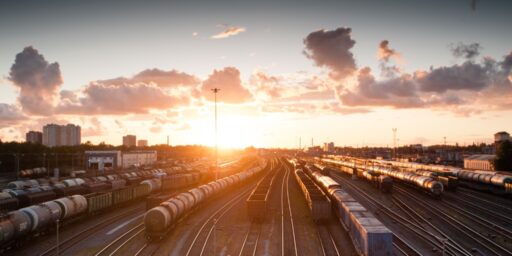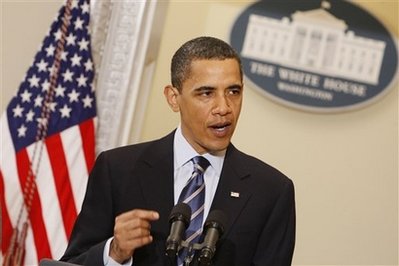Infrastructure Projects And Economic Stimulus
Are infrastructure projects the key to turning around the economy? Not really.
Dave Schuler makes an interesting comment over at his site regarding the argument that one hears very frequently from liberal economists and politicians that one way to deal with our current economic downturn is to ramp up infrastructure spending:
This morning I heard Larry Summers being interviewed, making his case for borrowing money at today’s low interest rates and bringing forward maintenance projects which would otherwise be necessarily performed some time in the future, say, rebuilding Kennedy Airport.
The reason that’s not done is that there are no plans in place for doing it, it will take years to put together such plans, approve them, and let the contract, and the bidder to whom the contract would ultimately be let is a large, established company with a proven track record and incentives to perform the contract, now five or ten years from today, with the equipment and labor it has on hand rather than purchasing new equipment or hiring new workers. Construction projects aren’t performed the way they were during the Depression of the 1930s any more than banks operate the way they did in the 1830s.
The idea that putting money into infrastructure projects would provide immediate economic stimulus to the economy was a central part of the President’s 2009 economic stimulus package, of course. While the Administration continues to point to that package as the reason the economy is doing so well today, as dubious an assertion as saying the economy is doing well might be notwithstanding, the reality is that the actual record of law’s impact on the economy tends to back up the point that Dave makes in the excerpt above. For one thing, it became clear rather quickly that there really is no such thing as a “shovel ready job,” to borrow a term that the Obama Administration and its supporters used quite frequently during the debate over the stimulus three years ago. This is largely true thanks to the same issues that Dave raises in his post, the fact that, in modern America, you cannot just hand money to some authority somewhere and know that they’ll be able to use it to build a road within the next year or so. As if that weren’t bad enough, we learned after the fact that the jobs supposedly “created or saved” by the stimulus bill cost more that $200,000 per job, a metric that is simply a perfect example of the waste and inefficiency that always seems to accompany a government endeavor. Given this, it’s not at all surprising that the actual impact of the stimulus on the economy was minimal at best.
Despite the documented evidence that the infrastructure spending in the economy had little immediate impact on the economy and jobs, we continue to hear calls for more infrastructure spending from the left. Paul Krugrman makes the call on a seemingly daily basis, for example, while his Times colleague Thomas Friedman has had a fetish for China-style infrastructure projects for years now. You hear similar things from the halls of Congress, cable news talking heads, and indeed the White House itself. What none of these people seem to recognize, though, is the reality that Dave points out in his post. Namely, the United States in the 21st Century is not the same as it was in the 1930s, and it certainly isn’t the same as China. Even if one were to concede the economic logic of these arguments, which I do not, the fact is that our government is simply not capable of moving quickly on massive projects like this anymore. It took five years to build the Hoover Dam, then one of the biggest engineering projects of its time, does anyone actually think a similar project could get done in a similar amount of time today?
There are many reasons why this is the case. Environmental and health and safety laws mean that projects must go through far longer review processes than they have in the past, for example. Are any of the advocates of increased infrastructure spending suggesting that we suspend those laws so that the projects can move faster? I’m going to guess that the answer to that question is no. Additionally, government contracting and federal labor laws that weren’t in existence 70 years ago increase the cost of large scale construction and the labor costs associated therewith. Other federal laws require that certain portions of each contract be awarded to “minority owned” firms, a practice which has resulted in the creation of various front corporations that exist solely for the purpose of getting the bidding benefits associated with being “minority owned.” Finally, when it comes to large scale construction projects there are a limited number of companies capable of performing this type of work, and to a large extent they already have labor forces that are moved from job to job. Awarding them a new contract isn’t going to necessarily lead them to hire that many new employees.
None of this is to say that there aren’t worthwhile infrastructure projects out there. However, even if Congress passed a “repair all the bridges” bill tomorrow, it would still be some time before those projects would get up and running, and even longer before the benefits of those projects would begin to, shall we say, trickle down to the point where they would have a noticeable impact on the economy. There is, no doubt, work to be done, but we need to abandon the idea that these projects are immediate cures for economic troubles and recognize them for what they are, long-term projects whose benefits may not necessarily be felt for some time. What this means, of course, is that the proper why to evaluate infrastructure projects is by determining what needs to get done, determining what you can spend, and prioritizing. Viewing these projects as some quick fix for a stalled economy is a mistake based on fallacies.







In other words, tcapital infrastructure projects are beneficial (for many reasons) and would probably help, not in the very short run, but in a mid-term run type of time frame. We should get on with it and start doing it.
al-Ameda,
Well yes but one must remember that politics today deals in the short-term and searches for immediate impact.
Hundreds of thousands of dollars to create a job, really? You mean those guys out at the airport I work at can’t make concrete and dump trucks appear out of thin air?
Definitely you can’t wave a magic wand and have jobs fall from the skies. That said, however, there’s not any doubt that government spending on infrastructure can be a good thing and can create lasting, valuable jobs. The problem with that “stimulus” boondoggle is that fixing potholes and repaving roads in Democrat Congressional districts is not a sound use of public dollars, no matter how you define infrastructure spending.
We need more gasoline refineries. How about loan guarantees and environmental waivers to make that happen? The same would hold true for nuclear power plants, shale exploration, natural gas exploration, LNG terminals, LPG plants, pipelines, rail extensions, etc.
Certainly we would be a lot better off if we damed up more rivers. Hydroelectric power is effective and clean. It’s a no brainer.
Cutting edge submarines and guided missile cruisers always are a good idea. If we obtain too many of them Taiwan and South Korea I’m sure would be happy to pick up the slack.
Statists view government spending as the one and only panacea. It’s not. Especially when the money is pissed away on pure pork barrel nonsense.
I have my quibbles with Doug’s general frame here, but the central claim – that infrastructure projects don’t work the way they did back in FDR’s time – is clearly true and should be thought through.
One of the reasons we can’t build the Hoover Dam in 5 years today is that a bunch of workers died (112 official deaths, plus others officially claimed as “pnuemonia” but really carbon monoxide poisoning) building the Hoover Dam b/c nobody particularly gave a sh*t about their working conditions. We don’t allow that sort of thing today, and for that and other reasons, it takes longer to do things. Which, in turn, can crimp the style of the would-be Keynesian stimulator. 😉
I wouldn’t mind having a look at what other things may be slowing us down (and ramping up costs – IIRC, we pay more for infrastructure work than most of the rest of the developed world). But yes, if the trade off for making “shovel ready” a reality is getting workers killed, I will indeed pass.
Waivers from what, exactly, though? Devil’s in the details. And let’s not pretend that if we all agree to look the other way, eventually we’ll have to pay (more) to clean up the mess. It’s a bit like borrowing to spend now, and accepting you have to pay the money back later. If the economy grows well, you can do that w/o a great deal of pain. Similarly, if the refineries and whatnot don’t make such a mess as to sicken/kill a bunch of people and you have strong economic growth in the meantime, you can afford to spend some money down the road on cleanup and hey not too many people died early so yay.
All of which is to say I wouldn’t categorically rule out such ideas, but let’s be honest about the tradeoffs involved.
@Rob in CT: The biggest environmental waiver would be the environmental impact studies to performed to determine whether there are any environment problems to evaluate, or the environmental assessment studies to determine whether or not to take the time and expense to produce an environmental impact study.
@PD Shaw:
Hmm. Yeah, ok by me.
Doug is largely correct because, as he writes, large infrastructure projects are medium-to-long term in their stimulative effects. The $200,000 figure per job is immaterial as we can easily afford to spend sufficiently to generate full employment, but there are more effective and less intrusive ways for government to boost aggregate demand. We should be focusing our efforts on getting dollars directly to consumers rather than working through corporate middlemen who divert considerable money from actually stimulating.
@Ben Wolf:
Meh, to me it’s still sort of a nonsensical argument. If the complaint is that 4 years after the recession, the labor market is weak… then medium and long term stimulus is still just as good as short term stimulus.
The stimulus should have been bigger. Musing over how immediate the impact of infrastructure projects are while still complaining about the current economy 4 years later… Doug simply hasn’t figured out a way to contextualize his ideas. As for what these ideas mean to the economy now… they mean the same thing. You go for short term stimulus (more money for food stamps, pay roll tax cuts) and long terms things (infrastructure projects) because the latter still has to happen anyways so you might as well borrow while it’s cheap and you’re providing a smaller shock to the economy as the stimulus wears off.
Here’s a simple solution-
the government should at all times have a list of x number of useful infrastructure jobs for which all of the environmental and safety reviews have been done. Have them ready to go, and when you have an economic downturn green light y items from the list, shove the cash at them, and prepare at least that many more additional items to be added to the list. Every ten years go through the list and kill any projects that have become antiquated or otherwise unneeded and create new elements to take their place.
Except that spending on infrastructure not only gets dollars to consumers (through their pay checks) but also can improve the efficiency of the nation as a whole. Our internet connections are third rate among OECD companies. Our 3G phone system wouldn’t even be considered 3G in europe, but it’s the best we can do on our aging infrastructure. Fix those things and you get a big efficiency multiplier on further expenditures.
Hell, even just repaving a road increases the fuel efficiency of every car and truck that uses said road.
Efficiency is the next big gold or oil boom. It’s sitting there waiting for somebody, anybody to actually get serious about it. Whatever country does is going to be the next superpower, I don’t care if it’s belgium, the benefits will simply catapult them to power.
So I guess we’re supposed to wait until our infrastructure falls to piece, after which we’ll think about doing something?
Hasn’t anyone ever heard the proverb: “a stitch in time saves nine”?
So how do you suggest fixing the US infrastructure, Doug? Or do you think there’s no problem?
Yes they can. Here in the bay area, several critical, long delayed infrastructure projects will be completed in the next 2 years with the help of stimulus $$$. Our local/regional economy is actually fairly important to the country as a whole. Eliminating traffic choke points and replacing critical roadways that are living on borrowed time is good for everyone.
One of your commenters already called you out on crappy math.
Hey, look at that, scrolling through Wikipedia’s article on the stimulus. A report by the CBO (dated November 2011) came around after your post (dated July 2011) that mentioned some disturbing things for your worldview.
Also, what happened to all that talk about deficit reduction which was so important a year ago? Infrastructure spending is a good way of reducing long-term deficits precisely for reasons you listed.
Well one major infrastructure project that was ready to go, and presumably could be easily restarted with more $$$ from the USG is the new tunnel under the Hudson from NJ to NYC.
Another is to finish (and place in operation) Yucca Mountain.
I am sure there dozens of pending state & local projects that could easily be moved up if the USG wants to upfront the money.
Here in Minneapolis, we had a rather notable interstate highway bridge collapse in August 2007. The bridge reopened in September 2008. The notion that major infrastructure projects are always pitifully slow-moving is a fallacy.
I believe a major factor why MN got the money so quickly was because Pawlenty was Governor and there were GOP political considerations at stake.
If the GOP get the levers of power again, I wouldn’t be surprised if they wouldn’t rediscover the benefits of infrastructure but use it as an excuse to gut all sorts of public-good regulations.
Obviously, Doug is right. The only way to rebuild our economy and our infrastructure is to give tax cuts to billionaires. Then the magic market fairy will come down and make everything good again.
@Tlaloc:
The environmental reviews has an expiration data. A five year old EIS is not worth and would have to be updated. EIS are very expensive. Can any state or city justify doing one for a “just in case” reason.
Also, activist can file lawsuits and petition the government at any time. That is another reason government projects are slow.
And last, construction is capital intensive and actually employ very few people.
@Rob in CT:
History shows it didn’t work then, either. Then, as now, it extended the economic downturn it was supposed to cure
Bithead knows this is true because he read it on a wingnut blog…
Actually, the Cole and Ohanian paper didn’t properly model the zero lower bound on nominal interest rates. For a more complete framework, see Eggertsson (2008), “Great Expectations and the End of the Depression.” He shows that various policy pronouncements, in particular, the suspension of gold convertibility, had profound effects on inflation expectations, which then reduced expected real interests rates. It’s the rational for those of us who call for the Fed to raise its inflation target and to announce it loudly and broadly.
@anjin-san:
“Bithead knows this is true because he read it on a wingnut blog… “
Some excellent information originates from small sites, manned by serious scholars, entrepreneurs, people interested in research and facts based on reality rather than theory. They oftentimes disburse their renderings in a non-grandiose cyber space fashion, rather than elitist publications that catch the eye and command respect from people such as yourself.
The piece posted, given ‘wingnut’ appraisal by you, was nonetheless, succinct, mirroring information and analysis of The Great Depression which differs from the professorial approach of Arthur Schlesinger, whom many think of as the sage historian of that era. More recent monetary reviews of the 30’s, though, delve into The Great Depression’s problems and solutions differently. These people assert that the “Great” part of the depression was added because of its depth and duration, aided and abetted by too much government intervention.
Hence, Obama, in following FDR’s approach to an economic crisis, has created a struggle between business participants in the market and anti-business academics who surround him as advisors. Much like FDR and his ‘Brain Trust,’ Obama has his Valerie Jarrett types — a slum lord in private life and a self-righteous social progressive in her public persona. FDR had his Schechter Brothers law suit, while Obama has his HC bill up before the Supreme Court. Both men overreached in their powers, and in the estimation of many, elongated depressions/recessions by expanding government at the expense of diminishing the people’s rights and power of self-managment.
@anjin-san: So, you dispute the facts and stats he cites?
He’s hardly the only one who has pointed to those stats.
It’s like you, Anjin to poke fun at the sources of facts you can’t dispute. You clearly have nothing to offer, other than denial. Big shock, that.
@jan:
And such efforts of governmental micromanagement always fail. Who was it who suggested trying the same thing over and over and expecting different results to mpop up eventually, is the working definition of insanity?
It’s a strawman argument, as if the only reason to have infrastructure was to have stimulus.
No, actually, a lot of infrastructure is good and necessary, and opposing it because it might be called stimulus becomes a perverse argument.
Better to talk about what infrastructure needs maintenance, or what infrastructure needs growth, or what new infrastructure would bring benefits over the next century.
Again though, the opposite, to avoid that kind of contemplation, because it might be called stimulus, is irrational.
Note John the only reason to have stimulus was to grow government and to grow the power of the unions working within it. at the end of the day, it didn’t help the economy at all then or now.
The word stimulus is a misnomer the off … the only thing it stimulated is the ability to buy votes. The only real solution to the problem was private sector jobs, and Obama will not do that since it doesn’t fit his mantra. Or, your own, apparently.
@Eric Florack:
I remember when Obama unveiled his plan, with a couple years of stimulus, and then after that a reduction in spending.
Many people, probably you included, said “oh no, government spending never goes down.”
And yet it did. He told the truth.
Can you learn? Adapt?
Back on-topic, if you believe that there is good infrastructure, and you believe in counter-cyclical spending, then you WILL try to build out in slow times, rather than fast.
When you build in fast time you DO crowd-out, and compete with private initiatives.
http://www.aljazeera.com/indepth/opinion/2012/05/201252971912913797.html
Where I live, the stimulus funded three long delayed, critical infrastructure projects, providing well paying jobs and all the downstream benefits of major construction projects. There have been dozens of smaller infrastructure projects as well.
Not getting your opposition to investing in our own country.